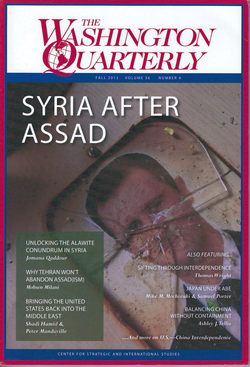"The Middle East is the graveyard of predictions" notes the left-wing writer and editor Adam Shatz. That's partly because it's so volatile (no one in 2014 imagined the revival of an executive caliphate after eleven centuries) and it's perverse (Turkey's President Erdoğan started a near-civil war against the Kurds to win constitutional changes he does not need).
In part, too, predictions fail because of the general incompetence of the specialists in the field. Often, they lack the common sense to see what should be self-evident. Case in point: the collective swoon upon the accession of Bashar al-Assad to the presidency of Syria in 2000.
 David Lesch on television. |
But most observers divined in the young Assad a decent fellow if not a closet humanitarian. David W. Lesch, an academic who rejoices in the title of Ewing Halsell Distinguished Professor of Middle East History at Trinity University in San Antonio, Texas, led this particular pack. Lesch befriended the young strongman, enjoying what his publisher calls "unique and extraordinary access to Syria's president, his circle, and his family."
Those long hours of conversation led to a 2005 book, The New Lion of Damascus: Bashar al-Asad and Modern Syria (Yale University Press) and a cascade of praise from fellow academics: Moshe Ma'oz of the Hebrew University found it "very informative and perceptive." Curtis Ryan of Appalachian State University called it "revealing." James L. Gelvin of UCLA praised it as "an extraordinarily readable and timely account." A prestigious Washington think tank hosted a discussion of the book's findings.
 But the passage of a dozen years, half of them consumed by Assad's monstrous brutality in the region's most lethal civil war of modern times, provides a very different perspective from which to gauge Lesch's scholarship.
But the passage of a dozen years, half of them consumed by Assad's monstrous brutality in the region's most lethal civil war of modern times, provides a very different perspective from which to gauge Lesch's scholarship.
Assad responded to peaceful demonstrations against his regime that began in March 2011 not with reforms but with vicious force. The total number of dead totals about 450,000 out of a pre-war population of 21 million. Assad's personal barbarism has throughout been the key to this conflict; exploiting his control of the skies, his troops have perpetrated an estimated 90 percent of the war's fatalities.
According to the United Nations High Commissioner for Refugees, over 5 million Syrians have been internally displaced and another 6.3 million have fled the country, causing crises in such disparate countries as Jordan, Lebanon, Turkey, Greece, Hungary, Germany, and Sweden.
In light of this appalling record, Lesch's account contains many passages of extreme gullibility and poor judgment. He assessed Mr. Assad roughly as he might a university colleague, deploying such adjectives as "compassionate," "principled," "unassuming," "innocent," and "morally sound." He described Assad as "a man of great personal integrity" with "appealing sincerity" with "a vision for the future of his country." Those who meet Assad, he tells us, are struck by "his politeness, his humility, and his simplicity." Turned around, "The thuggish behavior ... associated with his father is not in Bashar's character."
 Bashar al-Assad's "vision for the future of his country"? Aleppo in October 2014. |
For Westerners, he's cool culturally: "As well as liking music by Phil Collins, he enjoys Kenny G., Vangelis, Yanni, some classical pieces, and 1970s Arab music. He loves classic rock, including the Beatles, Supertramp, and the Eagles, and he has every album by the Electric Light Orchestra."
 As for his wife Asma, she "certainly seems to share her husband's calling to do everything in his power to make Syria a better place for their children and grandchildren."
As for his wife Asma, she "certainly seems to share her husband's calling to do everything in his power to make Syria a better place for their children and grandchildren."
To his credit, Lesch recognizes the possibility of an implosion, "with regime instability leading to a potential civil war." But he rejects this scenario because "The opposition to the regime within Syria ... is divided and relatively weak."
New Lion, a monument of scholarly humiliation, not surprisingly is out of print and has vanished from Yale University Press's website. More surprisingly, Yale in 2012 returned to Lesch for another masterpiece, this one with the unfortunate title, Syria: The Fall of the House of Assad.
Mr. Pipes (DanielPipes.org, @DanielPipes) is president of the Middle East Forum. © 2017 by Daniel Pipes. All rights reserved.
 Aug. 9, 2017 addenda: (1) For another doozie, note the Washington Quarterly cover story from Fall 2013, "Syria After Assad."
Aug. 9, 2017 addenda: (1) For another doozie, note the Washington Quarterly cover story from Fall 2013, "Syria After Assad."
(2) For a deeper look at the problems with Lesch's 2005 and 2012 books, see David Schenker, "The New Arabists," Commentary, November 2012. (Click on "Print" to download a PDF of the article.) For example, Schenker notes that Lesch's favorable 2005 assessment came
after Bashar had systematically decimated Syrian civil society through mass arrests of participants in the so-called Damascus Spring of 2001 and 2002. As Lesch was lavishing blandishments on the New Lion of Damascus, the leading lights of Syria's nascent pro-demoPRcracy movement were languishing in Assad's dungeons. Meanwhile, the regime was torturing and killing prominent anti-Assad Kurdish cleric Shuwayhat Khaznawi, and its Hezbollah friends in Syria-occupied Lebanon were assassinating the state's former premier, Rafiq Hariri.
Letter to the Editor
Academic Questions, Summer 2021
The recent issue of Academic Questions was a "breath of fresh air," with one exception. It is comforting to read articles which discuss openly issues which cannot get an airing in any main stream media—so much for free speech these days.
However, I was surprised to see an article by Daniel Pipes. He is the founder of Campus Watch (see article in Wikipedia), an organization that exists to track any criticism of Israel on college campuses. It urges students to submit reports on individual professors who may be critical of Israel.
He is not an objective judge (as much as that is possible in political science!) of anything in the Middle East.
In my opinion, including his article on Assad in Syria was certainly not in keeping with the sterling quality of all the other articles in the recent issue.
Keep up the good work!
Best regards,
Bill Nadeau
Daniel Pipes responds:
I can't figure out if Bill Nadeau's complaint about my article, "Getting Bashar al-Assad Very Wrong" is serious or comedic. Here are my reasons to think Mr. Nadeau wishes to be funny:
- Citing Wikipedia as a source. Relying on its biased entries to learn about Campus Watch rather than the Campus Watch website leads him to draw factually incorrect conclusions about it. (Israel is not our focus and we do not urge tattling on professors critical of Israel.)
- Implying I am a political scientist. (I am a historian.)
- Not specifying a single wrong fact, faulty opinion, or anything else deficient in my article.
- Offering no critique of my work while deeming me "not an objective judge ... of anything in the Middle East."
- Defending Bashar al-Assad, a thug who is arguably the world's worst living mass murderer.
 Oct. 7, 2023 update: Today, Hamas massacred hundreds of Israelis and took many more hostage. That makes this a good time to recall Tareq Baconi's immortal 2018 study, Hamas Contained: The Rise and Pacification of Palestinian Resistance, then a visiting scholar at Columbia University. Comment: No one gets things quite so wrong as the scholars of Middle East studies.
Oct. 7, 2023 update: Today, Hamas massacred hundreds of Israelis and took many more hostage. That makes this a good time to recall Tareq Baconi's immortal 2018 study, Hamas Contained: The Rise and Pacification of Palestinian Resistance, then a visiting scholar at Columbia University. Comment: No one gets things quite so wrong as the scholars of Middle East studies.
